Kenneth Branagh’s autobiographical Belfast recalls a seismic year in his hometown, when the advent of The Troubles uprooted his entire childhood. Screen sits down with the writer/director to discuss four pivotal scenes.
After a prolific stage and screen career in front of and behind the camera, Kenneth Branagh enters the awards race with his most personal project to date.
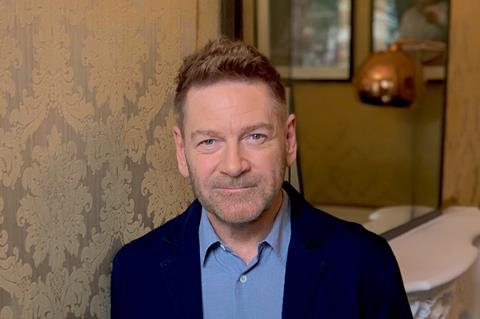
Drawing on his own childhood experiences, Belfast — which he wrote and directed — follows nine‑year-old Buddy (Jude Hill), whose insular late-1960s neighbourhood is suddenly upended by the arrival of The Troubles.
As the violence in Northern Ireland escalates, Buddy’s Ma (Caitriona Balfe) and Pa (Jamie Dornan) wrestle with the decision of whether to leave for a new life in England — something to which Buddy is vehemently opposed, particularly as it will mean separation from his beloved grandparents Pop (Ciaran Hinds) and Granny (Judi Dench).
Shot in black-and-white under strict protocols during the Covid‑19 pandemic, Belfast has become a major awards contender, earning nominations from both the US Producers Guild and Directors Guild, as well as six Bafta nods including best film and outstanding British film. The strong naturalistic performances found favour at the Screen Actors Guild awards, with Belfast netting nominations in supporting actress (Balfe) and cast — the latter including newcomer Hill, who makes his debut as the young Branagh.
“With Jude, you had this sense that something quite profound was happening to this young actor,” recalls the director. “That he was having to experience emotions or feelings that he, as a person, was new to. I tried to capture the best of him — the real thing that was happening right before our eyes.”
Hill features in all of the four key Belfast scenes Screen International discussed in detail with Branagh. Spoilers ahead.
The bus ride with Buddy and Granny
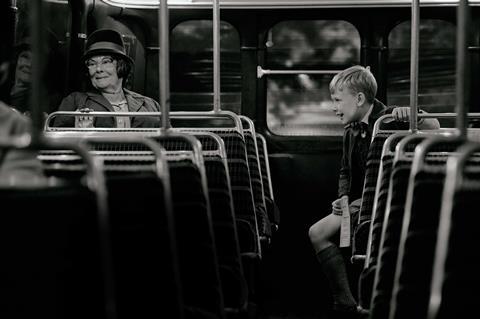
The scene: Buddy and Granny share a delightful visit to the local theatre to see A Christmas Carol and, on the bus ride home, discuss her past and whether she ever wanted to leave Belfast.
Kenneth Branagh: “I wrote what I remembered, then I did a bit of research and found out that, yes, A Christmas Carol was on at the Grove Theatre in December 1969. I found the ad in the Belfast Telegraph of that time, so I knew I hadn’t been dreaming. It made a tremendous impression on me.
“In terms of shooting the play [which is seen in colour, like scenes from Chitty Chitty Bang Bang on a later family trip to the cinema], it was a celebratory couple of days we had in the theatre. Jude hasn’t been to the theatre that much, so it was a real event in his eyes. He was also aware Judi was in her natural environment, she is a legend of the theatre. So you caught that sense of wonder from Jude, and that perfect placement of Judi. And it sets up that very lovely bond between them that was going to carry through into the scene on the bus.
“One of the things we were trying to do with the film was get a sense of motion, the sense that people would have to leave. The world was not going to stand still, as this boy may have hoped.
“We shot the sequence with process photography; the bus was on a soundstage and we had LED screens with real Belfast backgrounds. From a technical point of view, we’ve dealt many times with real buses, real trains, and they have their glories, but they can also limit you technically. For this, we wanted a very concentrated atmosphere that did not interfere with the naturalness of the connection between Jude and Judi.
“Judi is the least indulgent actor — if she sees a big moment, she generally won’t take it. All I said to her was to let that moment breathe. Judi opens a window to the soul of a woman who has made sacrifices. She has no complaint about it, but they are there and we see them because of her artistry.
“The moment she does so beautifully well is when Jude, with the guilelessness of youth, asks if she’s ever been to Shangri-La [after the pair have discussed the 1937 film Lost Horizon]. She takes a while to think before she says, ‘There were no roads to Shangri-La from our part of Belfast.’ We don’t necessarily get to scale our own individual Everests in life; we don’t necessarily get to the glitzy places we hope to. Judi manages to mine that with a real sense of depth, without indulging in any self-pity.”
The hospital conversation between Buddy and Pop
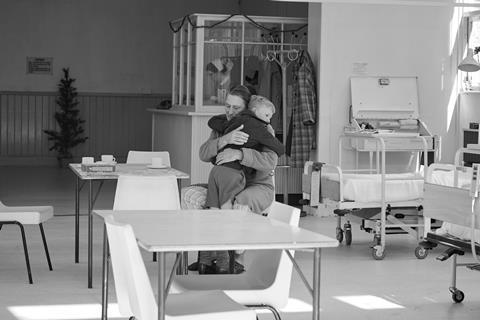
The scene: As Buddy sits at the hospital bedside of his grandfather Pop, the pair have a heartfelt discussion about the boy’s fears of moving to England and leaving behind everything he knows.
Kenneth Branagh: “[Pop and Buddy’s] natural bond was provided by the personalities of these two actors. Ciaran Hinds is a gentleman — he has a tremendous soulful quality, he is a good listener and is a calming presence. His relationship with Jude was a quiet one, but they were very at ease in each other’s company. They saved their sparks for when the camera rolled.
“As young as Jude is, he has a background of Irish dancing and competition, so he’s used to preparation, practice, performance and then hanging about. That’s a good basis for a scene like this, where he’s going to be doing most of the listening but he has to stay poised on tenterhooks. He is also sensitive to the atmosphere of the scene. We kept it very much in the air that, even though it’s never spoken, there’s an understanding in the family that when Pop goes into hospital, he may not be coming out.
“We were very careful to keep all the blinds up at the windows, to see the wind in the foliage outside. We took furniture out, so that the black and white could emphasise this transitional space, give it the atmosphere you sometimes see in movies that present a version of heaven.
“We didn’t talk about [the scene] too much. I have learned as a director to leave talented people alone as much as possible. In Ciaran’s case, his connection to the material was profound. We probably did about four or five takes of his side of it. With Jude, I would keep the camera running and offer notes. I just threw things in so he was ready to respond.
“This scene is the heart of the film for me. It’s about understanding, and gaining from a grandparent this piece of advice that might work as a kind of passport for you. The grandfather knows what the kid does not: that there will be a series of ruptures that had started with the violence [between Protestants and Catholics], and departures. The leaving of Belfast. And how can you carry with you something that, even for this nine-year-old boy, is so clearly part of your DNA — a sense of absolute certainty about who you are and where you belonged. It becomes a very important piece of advice, to understand that if you were comfortable with who you were in yourself, you take that out into the world.”
The family decides to move to England
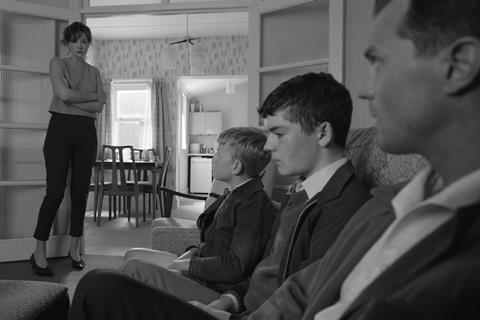
The scene: After extracting Buddy from a riot at the local supermarket, during which he steals some washing powder, Ma gathers the family in the living room and tells them they will make the move to England.
Kenneth Branagh: “This is a moment of truth. We’ve just witnessed the capacity for human beings to be caught up in the fervour of energy, which takes away rational thought and replaces it with a feeling that makes a nine-year-old walk through a smashed window to steal some soap. That will have a mother trying to explain ‘Thou shalt not steal’ by dragging her kid back into the most dangerous situation [Ma makes Buddy return the soap to the supermarket, which is still being violently looted].
“We put the three boys [Buddy, his father and brother Will, played by Lewis McAskie] together on the sofa, frankly looking like three children, including dad. And mum is the one who is going to have to take the responsibility of articulating and owning what they are going to do.
“In theatre terms, something people have said to me in the past is: ‘If you’re going to do something important, find an area of the stage you’ve not been on before. Don’t be where other important things have happened.’ So here we unusually go quite high for our close-up of Caitriona. We do so for a couple of reasons — partly to let the audience intuitively know there’s something different about this. It also allows us, in a shot of depth, to look all the way out through the dining room, the kitchen, the backyard and beyond, in which there is an indifferent world with people just doing their own thing. But in here, there’s this close-up of this woman facing her family in the quiet.
“There’s a quiet strength and intelligence that Caitriona brings to this scene. There’s an acknowledgement of disappointment in herself, that she could have brought the kids to this state of danger. Even as she speaks, she’s trying to work out what her decision is.
“I told Caitriona, ‘You don’t know before you’ve got to the end of this what you’re going to say. This is a scene where this decision has to happen to you, you have to live in that moment.’ It’s a revelation, and also very painful to understand that some of what she thought mattered before doesn’t matter anymore. While understanding that will be a way for her to let go [of Belfast], it will cost her to make this sacrifice.’
The celebration after the funeral
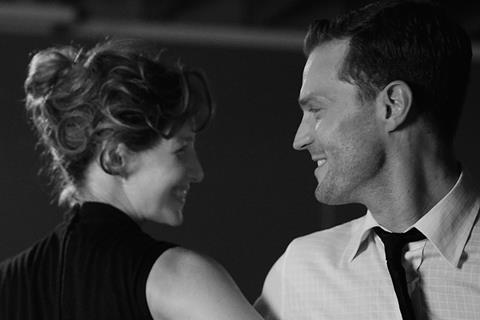
The scene: After the family have buried Pop, they celebrate his life with a raucous party during which Pa serenades Ma with a heartfelt rendition of Love Affair’s ‘Everlasting Love’ — with Buddy looking on delightedly.
Kenneth Branagh: “That sense of release is necessary. In my case, my own dad slept for five nights on the sofa next to my grandad’s open casket. People came in every day with drinks and there was some necessary gallows humour. Then, after grief, there’s a necessity to shake it off, to reassert life through music, dancing, physical movement. As much joy as you can dig into. Lunacy, yes. Absurdity. Pretend to be the movie-star couple in the middle of the room.
“While we’re seeing all that glamour, there’s also a shot with two jars of pickled eggs. That’s what I remember [from my childhood]; that’s what the catering was, because of limited funds. Because they were so strong, it took a long time for them to be eaten. There was never a rush on the pickled eggs, and it looked like you’d made an effort!
“Everyone is letting their hair down, letting tears of joy flow. Cinematically, we wanted the anthemic joy of that great 1960s song from Love Affair together with Jamie’s wholehearted commitment to giving it all with a lyric that was very pertinent for that stage of the story — offering love up to a woman of significant and impressive character. It’s a message of hope.”






![The Brightest SunScreen[Courtesy HKIFF]](https://d1nslcd7m2225b.cloudfront.net/Pictures/274x183/3/5/0/1448350_thebrightestsunscreencourtesyhkiff_312678.jpg)


















No comments yet